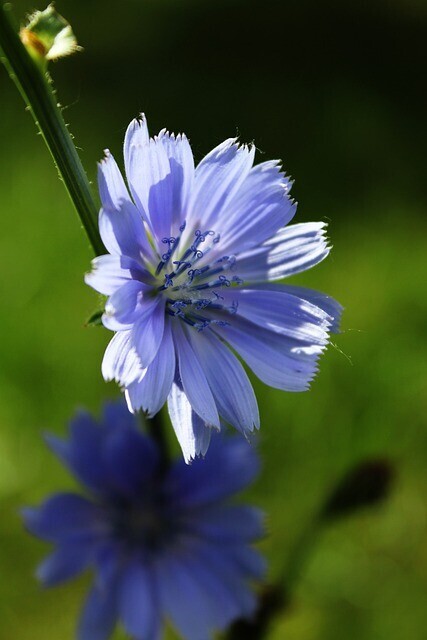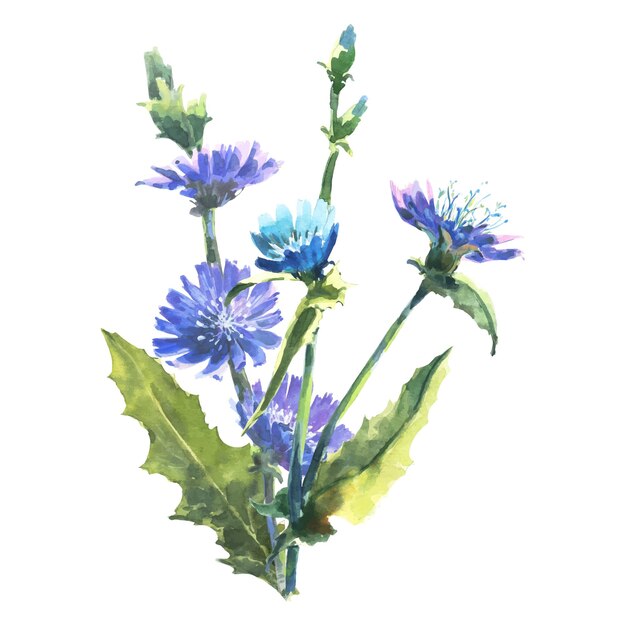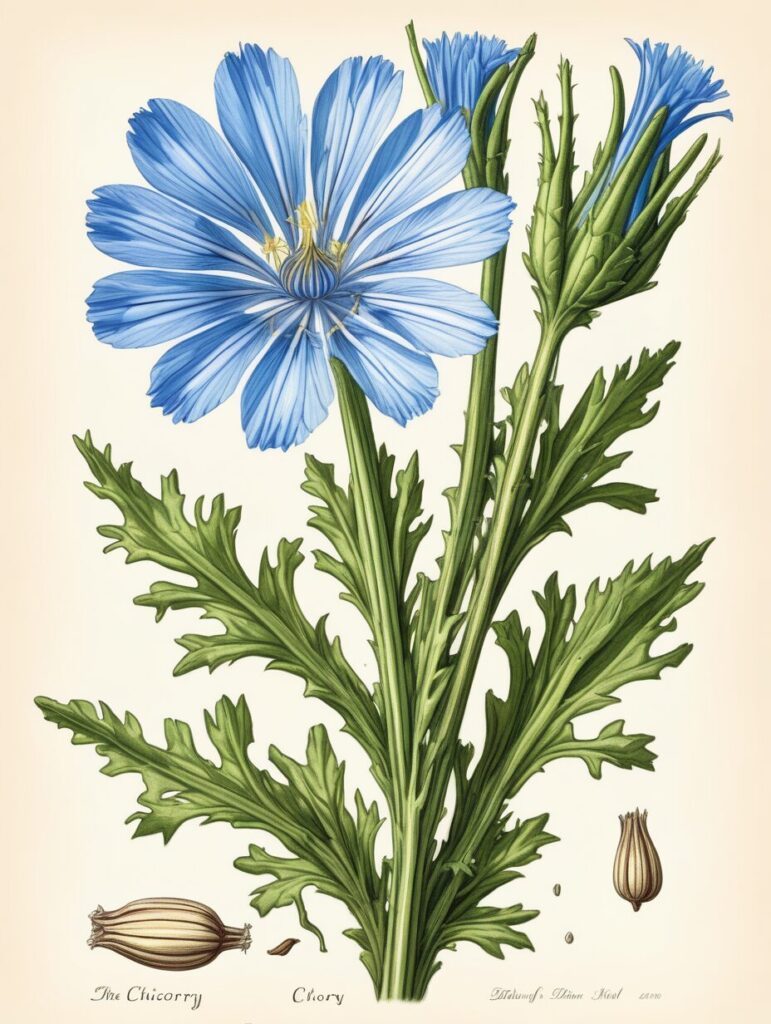With its dazzling bright blue flowers dotting roadsides and fields, chicory serves as a botanical symbol of resilience, wisdom, and unpretentious beauty. It’s a plant that straddles the line between the wild and the cultivated, reminding us with every sturdy stem and vibrant blossom of the balance between youthful exuberance and the serene wisdom of age. Chicory, a plant often dismissed as a mere weed, carries a profound narrative of self-worth and healing, with solid roots both in the earth and in the realm of medicine.



Deeply ingrained in herbal medicine, chicory has been cherished for its diverse therapeutic benefits, primarily for the digestive and hepatic systems. Functioning as a gentle liver tonic, chicory invites us to release anger and resentment, reminding individuals to cleanse the emotional baggage that stagnates within just as the liver cleanses impurities from the body. The symbolism here extends to the heart, encouraging the release of grudges much like the forgiveness and liberation I sought amidst personal battles with loss and betrayal.
As chicory blooms with an unshakeable vibrancy even in the harshest conditions, so too does it encourage us to find freedom from anger and open ourselves to love without expectation.
Chicory’s therapeutic value lies significantly in its beneficial impact on digestion. Known for its bitter compounds, chicory can stimulate digestive enzymes, enhancing the breakdown of food and the absorption of nutrients. This action soothes digestive disturbances and fosters a sense of gastric balance and comfort. Its bitter nature, often underestimated, compels the appetite to awaken, preparing the body for digestion and efficient nutrient assimilation. Chicory is Liver medicine.
Another remarkable trait of chicory is its role as a prebiotic powerhouse due to its high content of inulin, a dietary fiber encouraging the growth of beneficial gut bacteria. The nourishment of these good microbes fortifies the gut microbiome, supporting both intestinal health and overall wellbeing. This connection to gut health parallels the emotional and psychological benefits chicory invites, offering a metaphorical cleansing and renewal that matches its physical cleansing properties.
Chicory’s anti-inflammatory properties are attributed to its sesquiterpene lactones, compounds shown to modulate the body’s inflammatory responses. These compounds can inhibit the production of molecules that incite inflammation, offering a natural approach to mitigating chronic inflammatory conditions. This calming influence on inflammation amplifies chicory’s soothing capabilities, extending its healing reach from the gut to other systemic areas where inflammation might cause disruption.
Beyond the gut, chicory contributes to heart health, with studies hinting at its role in reducing blood sugar levels and potentially aiding in the management of conditions like diabetes. This multi-faceted approach to wellness showcases chicory’s versatility as both a preventative and supportive measure in maintaining holistic health.
Chicory offers an intriguing characteristic: its diurnal dance with the sun. The radiant blue flowers open with the morning light, welcoming the dawn, a phenomenon known as “nyctinasty.” This daily bloom not only maximizes photosynthesis but also echoes the plant’s zest for life and inherent beauty. Observing this ritual of opening and closing is a comforting reminder of nature’s rhythms, enticing us to find joy in simple, everyday marvels.
Organically integrated into culinary traditions, chicory offers a rich and earthy flavor profile, making it an excellent coffee substitute. Roasted chicory roots introduce a nutty, slightly bitter character, often blended with coffee or enjoyed independently as a caffeine-free beverage. This practice not only provides a robust, grounding flavor but also delivers chicory’s health benefits in a delicious, approachable form.
Culturally, chicory has graced the world of herbal remedies attributed with aiding liver functions, soothing digestion, and in historical contexts, treating ailments from digestive disorders to gallbladder issues. These applications underscore chicory’s esteemed place within natural medicine, a testament to its lasting value and versatility across generations.
Chicory, much like its growth habit, illustrates a steadfast spirit, determined to flourish even in adversarial environments. Its essence resonates with the promise of renewed strength and the perseverance needed to overcome challenges. It invites those who encounter it to harness its energy, to not merely survive but to thrive with passion and resolve.
As a living testament to transformation and healing, chicory also teaches lessons of acceptance and adaptation. In the aftermath of loss, while grappling with emotions, it became, for me, a comforting presence—a plant ally gently guiding the journey of mourning towards eventual acceptance and understanding. The resilience of chicory inspires a similar resilience in those who embrace its teachings, to find strength even amidst personal trials.
Planting chicory offers a fulfilling experience, whether starting from seeds or propagating hardy roots. Through intentional cultivation, chicory demonstrates its adaptability and offers gardeners and herbalists the gift of vibrant blue flowers and nourishing roots. With its capacity to thrive in a variety of settings, chicory stands as a reminder that even in unfamiliar ground, something beautiful and resilient can take root.
In your own garden, chicory can become a cherished ally. Its dichotomy of strength and delicacy exemplifies the balance we seek in our own lives. Embracing chicory in various forms—be it as a medicine, culinary ingredient, or spiritual touchstone—encourages healthful living and introspection. Every robust stem and vivid bloom stands as a testament to both living with purpose and letting go when needed.
Chicory encourages us to recognize and release our burdens. As I look back at my own journey—navigating grief, love, and healing—chicory remains a steadfast companion, inspiring courage, and resilience. It is a bridge between the physical and emotional realms, a soothing blue essence in a world often filled with complexity and challenge.
Chicory Root Latte Recipe
For those wanting to savor the earthy flavors and health benefits of chicory, here is a simple recipe for a Chicory Root Latte:
Ingredients:
- 1 tablespoon of roasted chicory root
- 1 cup of plant-based milk (such as almond, oat, or coconut milk)
- 1 teaspoon of raw honey or maple syrup (optional, for sweetness)
- A sprinkle of ground cinnamon or cocoa powder
Instructions:
- Roast the Chicory Root: Preheat your oven to 350°F (175°C). Spread the chicory root evenly on a baking sheet and roast for about 10-15 minutes or until fragrant and slightly browned. Keep a close watch to avoid burning.
- Simmer the Milk: In a small saucepan, heat the plant-based milk over medium heat until it starts to simmer. Avoid bringing it to a boil.
- Infuse the Chicory: Add the roasted chicory root to the simmering milk and let it steep for 5-10 minutes to allow the flavors to infuse.
- Strain and Sweeten: Remove the saucepan from the heat. Strain the mixture to remove the chicory root. If desired, add raw honey or maple syrup for sweetness, stirring well to incorporate.
- Serve: Pour the Chicory Root Latte into a mug. Optionally, sprinkle with a pinch of ground cinnamon or cocoa powder for added flavor and aroma.
Indulging in this latte not only brings warmth and comfort but also integrates chicory’s nourishing properties into your day-to-day experience, providing a moment of peace through nature’s simple yet profound gifts.





